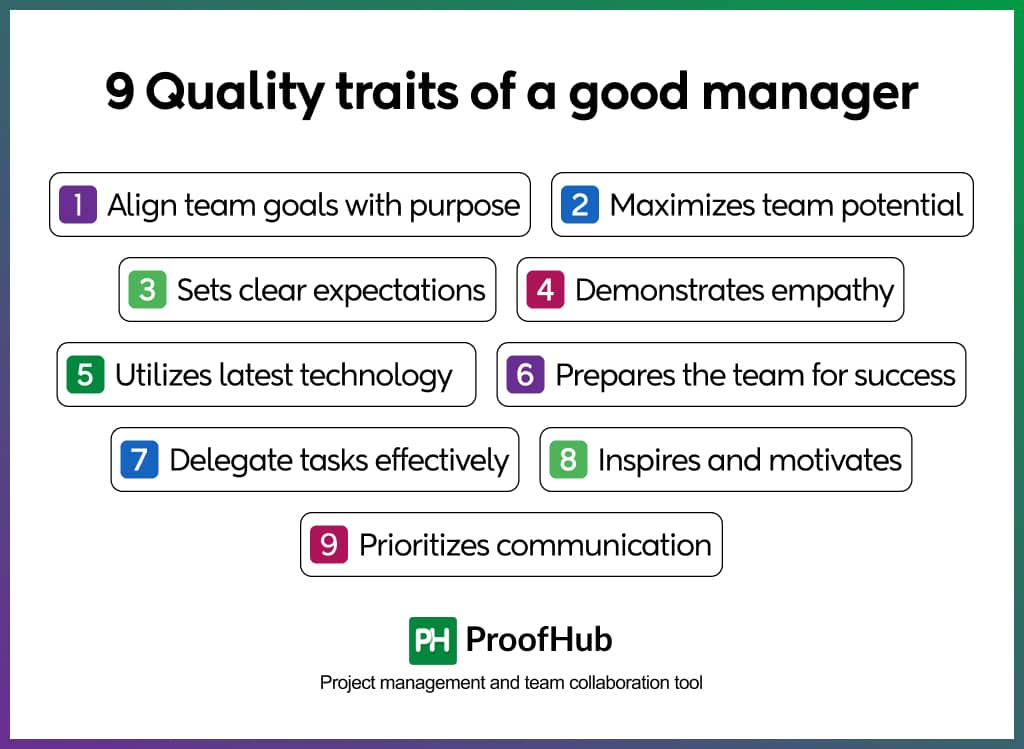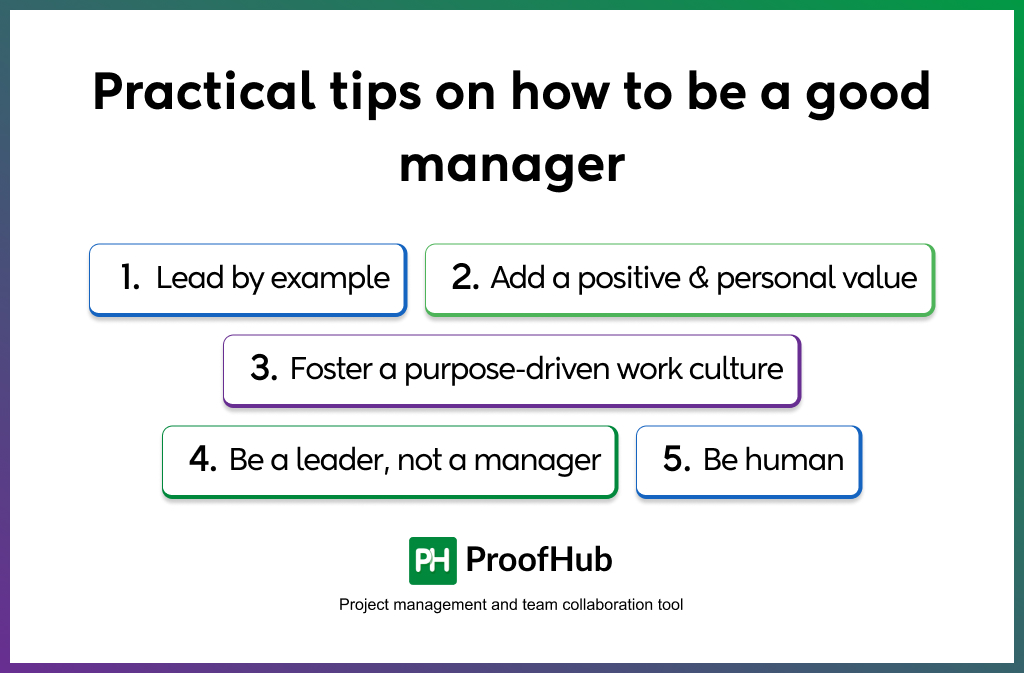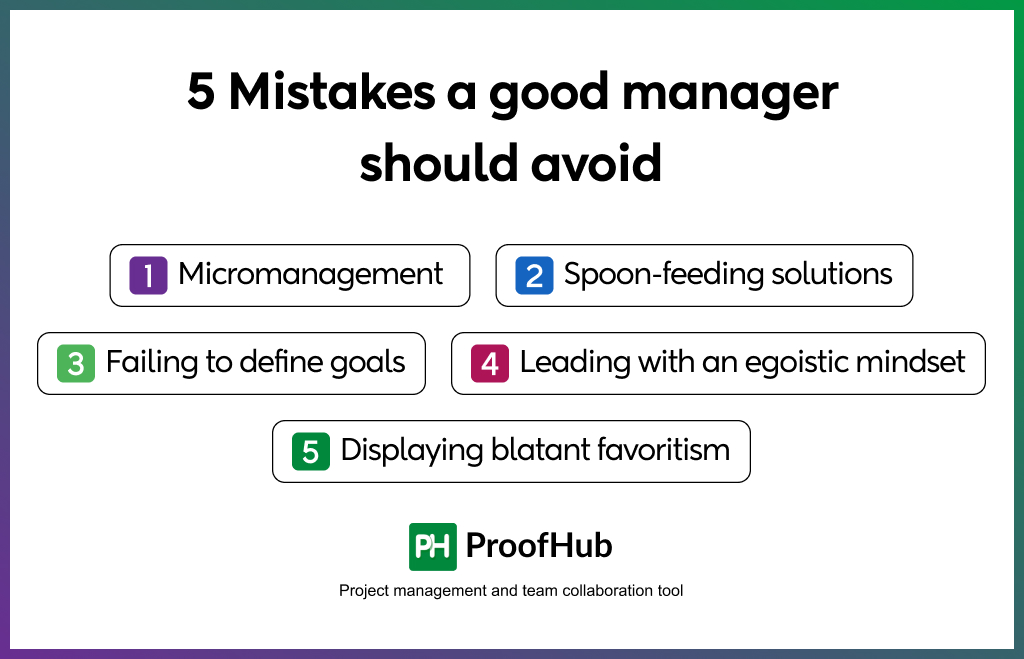What makes a good manager? This question must have come to your mind that’s why you are here.
“As John C. Maxwell put it, ‘Leadership is not about titles, positions, or flowcharts. It is about one life influencing another.’
This essence of leadership is crucial for a manager, who must not only lead but also influence their team.
We often remember our past managers for their good and bad qualities. Exceptional managers inspire us to be better, while challenging ones teach us valuable lessons.
So, without further ado, let’s just begin with how to be a good manager and what types of qualities are most desirable in a manager that makes a manager great.
9 Quality traits of a good manager
“What are the good manager qualities that separate him/her from the rest of the pack?”
Of course, it’s important to understand this before becoming a manager. Even if you’re already one, it helps to enhance your management standards.
You’re probably wondering about this already. So without wasting a jiffy, let’s give rest to your thought cycle and jump straight to know what is a good manager and what qualities they possess.

1. Align team goals with purpose
Organizational goals today are dynamic amid massive transformations such as regulatory changes, competition, and regularly updated technological innovations to adjust and adapt to the latest developments. In these uncertain environments, one of the best qualities of a manager is not just to tell their employees to do tasks, they help employees understand the value of their work and how it’s vital to achieve organizational goals.
Employees who have transparency about the mission of their organization tend to connect their work with the company goals and feel their job is more important and their work holds much significance. When the employees are sure about how their work contributes to the “big picture”, they tend to stick with the company for a long.
2. Maximizes team potential
Poor managers are biased, but good managers identify and understand the differences that every individual brings, and evaluate performance fairly and transparently, without prejudice. Best managers always recognize good performance and give credit where it’s due. Even when they identify weaknesses or faults, they criticize constructively to make employees realize their mistakes and work hard to correct them.
“As a leader, it is important to not just see your success but focus on the success of others.” – Sundar Pichai – CEO of Google & Alphabet Inc.
Good managers make sure they have an effective review process in place to evaluate performance fairly. Thanking employees for their contributions and rewarding them for a job well done are the signs of a good manager that go a long way in improving their employees’ morale. Good managers respect their employees and show them that they are valuable assets to the organization.
So, if you are a manager, make sure to celebrate even the smallest of employees’ achievements. Believe in your team even if no one else does, and you will undoubtedly bring out the best in them.
3. Set clear expectations
Good managers are quite direct and specific about their expectations of employees. They don’t give broad and vague instructions – thereby leaving no space for ambiguity. Whether it’s small daily tasks or a long-term project, good managers have a clear idea of what they expect from every employee, based on their ability and capacity.
Many good managers use the SMART goal method to define expectations. They also validate their expectations with specific reasons as to how these will positively affect you, your organization, and the employees themselves. When employees understand the reasoning behind the task, they’ll be more compliant and eager to take the required steps to meet expectations.
4. Demonstrates empathy
A study by the Center for Creative Leadership (CCI) shows that managers with empathetic behavior toward their team are viewed as good performers by their bosses.
Being empathic towards employees equips good managers to form personal bonds with employees, watch for signs of burnout, and foster long-term relationships with them. Empathetic managers understand the emotions of their team members and show compassion. They understand how team members are feeling, and this quality enables them to communicate effectively and solve problems right in the bud. As a result, their employees trust them more and managers can build rapport, which fuels team success.
5. Utilizes the latest technology
Smart managers know that technology, like project management software or online collaboration tools, is there to simplify the way they handle their teams and their teams manage their work. Moving forward in sync with the technology is the sign of a quick-witted mind because they are aware of the potential of technology – right from efficient task management and simplified collaboration to effortless reporting and time tracking.
This is the reason they never hesitate to invest in the latest tools. They are the first ones to look for tech solutions to make life easy for their teams and make them productive. By doing so they cannot only bring the distractions to a minimum, but also bring the best out of every team member, and that’s the reason they get all the admiration from everyone they deserve.
Advance! Progress! Achieve!
6. Prepares the team for success

Good managers don’t just inspire their teams to collaborate and work efficiently but prepare them for a voyage to excel. To ensure their team reaches the pinnacle of success, they don’t settle for less and focus on individual performances, while aligning their efforts with the overall team goal.
So, rightly said. It is only by bringing together all the aspects of successful team building like communication, collaboration, clarity, and trust, they make sure that the team knows the purpose of their efforts. They know that success comes only with collaborative efforts, and that’s exactly what they inspire the team to perform.
7. Delegate tasks effectively
Good managers delegate tasks effectively. They demonstrate faith in their employee’s ability to perform delegated tasks and allow them to learn new skills and develop strengths that they might not otherwise know they have. Good managers don’t delegate tasks randomly; they identify potential within their teams and assign work to the right people using the right methods and tools.
Good managers assign tasks and split responsibilities according to the potential and talent within teams. This helps to improve overall organizational efficiency as well as time management significantly. Assigning important tasks also helps team members develop confidence in their abilities, which motivates them further to put in their best efforts.
8. Inspires and motivates
Last but not least, a good manager never fails to inspire others. This inspiration comes at many levels; from boosting the morale of the team when things are not going right to talking it out with individuals when they are facing problems in their personal lives.
Good managers know that their role is not limited to making a productive environment. Rather they have a role to play in building an understanding and empathetic organizational culture so that individuals thrive and continue to strive for betterment at every level. When you are part of a positive work environment, innovation, and creativity come out naturally. And, that’s one of the hallmarks of a great team, led by an equally able manager.
9. Prioritizes communication
Effective communication is the key to not only maintaining amicable relationships in the workplace but also delivering work successfully. Good managers understand that knowing how to be a better manager involves investing time and energy into ensuring a smooth flow of communication throughout the project. This is one of the most intrinsic qualities of a successful manager that you’ll not find hard to spot.
The State of Business Communication report conducted on behalf of Grammarly in 2023 reports, reveals effective communication to be a factor in increasing the team’s productivity by 72% of business leaders.
From navigating team meetings with poise to providing people with the right direction in the project – a great project manager ensures that things never slip through the cracks. They are not afraid to take the help of the available resources like online communication tools for the same.
But keep in mind, no communication tool can ever replace workplace communication, but aids in facilitating better.
Maximize your team’s potential!
How can managers develop and excel in their leadership skills?
A manager is not given the training to be a good manager. Instead, it is a practice to be honed over time. Bagging the coveted title of a manager without doing the grinning and the groundwork to become the best one won’t pay you well in the long run.
Having a good manager is essential, like breathing. And if we make managers better, it would be like a breath of fresh air. — Michelle Donovan Director of People Operations, Google
So, if you have just earned this opportunity, you better pull your socks up and do comprehensive research on learning to develop and excel in your leadership skills to be a manager.
Trust me, doing so will prepare you for challenging as well as rewarding times ahead.

1. Add value to your role
When you decide to nurture your leadership skills, the first and foremost thing you can do is to learn and work on the parameter that adds value to not only your role but the organization as a whole. Be one step ahead and surpass the expectations of others to make your mark.
2. Practice ethical decision-making and integrity
Integrity and ethical choices go side by side. Managers should be honest and truthful towards their team and organization and must adhere to their commitment to strong values. A manager is a reflection of a company’s image, so a motivated and empowered person should be the face of the company.
3. Enhance emotional fitness
While we talk about employees’ mental fitness and well-being, high-hierarchical management is often blurred out from that vision. A manager who is strong-headed and prepared for any unforeseen circumstances can lead his team skillfully through the raging hurricanes of uncertainty.
4. Inculcate a growth mindset
As a manager, your role doesn’t confide you to suffice only your managerial needs but rise above them to be a leader. A leader who is consistent, who is learning and always improving. A good manager embraces the growth mindset and inspires others to follow suit to hone their skills.
5. Rehearse critical and innovative thinking
Good managers keep a sharp eye on potential opportunities and take hold of them in actionable measures to benefit the team. Also, they are open to innovative and better ideas. They admire the out-of-the-box thinkers and stone their thinking blocks in the pathway to success.
Take Control Back!
Practical tips on how to be a good manager
Countless organizations in history have fared and flourished exceptionally well under good managers and leaders. Amazon, one of the largest and most successful e-commerce companies, witnessed spectacular growth under the reign of Jeff Bezos, CEO of Amazon.
Success doesn’t come easy.
Make no mistake about it, the managerial role is a demanding job with additional responsibilities. You cannot act or perform the same way in a managerial role as you did as a regular employee.

You need to reflect on your uniqueness.
1. Lead by example
Operate the way you expect them to act! Choose to lead by example to curate a tone for the organization that is built on the foundation of trust and credibility. If you go beyond the limits of your employees, they will be more likely to return the favor and emulate these traits.
2. Add a positive & personal value
One of the characteristics of a good manager is to keep a fine balance between employees’ needs and requirements, their well-being, and aspirations along with business goals. And that can be done when employees see you as empathetic and feel that you care.
3. Foster a purpose-driven work culture
Motivating employees to see a broader and more successful vision is the other manager attribute, that lets you not only drive success and growth but build strong, cohesive teams. When employees thrive in a purpose-driven culture, they produce higher levels of productivity and engagement.
4. Be a leader, not a manager
Leadership strives to inspire and empower, and not just dictate. They don’t serve everything to their employees on plates. Rather, they develop and fine-tune their skills in a way that they can resolve the trickiest of situations on their own.
5. Be human
More often than not, managers have to manage so many things at the same time that they experience constant stress. But accept that you are a human and you can too make mistakes. Be responsible for the failure of projects, admit mistakes, and ask for help whenever you feel overwhelmed.
5 Mistakes a good manager should avoid (At any cost 😱)

Have you ever spent time figuring out how to be a good manager and what mistakes to avoid?
No?
Amid grueling schedules, managers may unknowingly commit some mistakes that can negatively influence their subordinates.
Here are a few horrible mistakes that managers should NEVER make while leading their team:
1. Micromanagement
Remember how annoyed you used to get when your manager used to peek over your shoulders at work? Now, remember all the nice things (pun intended) that you uttered in your mouth as you were constantly watched over by your managers many times a day. The point here is that:
No employee likes to be micromanaged and a good manager must bear this in mind.
Employees want a certain degree of freedom. However, their intrusive observations, manipulation, and exhaustive communication make employees doubt their capabilities and send a clear signal that their managers do not back them. Ultimately, making them feel defeated, and unappreciated in the long run.
No employee can develop his/her skills until managers show complete faith in them.
2. Spoon-feeding solutions
Another never to make mistake goes by spoon-feeding solutions. That said, some managers have this tendency to over-providing solutions for their teams. They are quick when it comes to offering solutions that their employees can find themselves with more effort than usual.
Will it in any way help them?
No, not at all.
This habit of serving on the plate without asking prevents employees from doing all the hard work of seeking the best solution themselves. By always helping employees with “the solutions”, managers stop their team members’ clocks and prevent them from putting their thinking caps on. Managers need not act like a school teacher who is always accessible whenever the team encounters problems, instead, allow them to take ownership of the problem at hand.
3. Failing to define goals
Let me be clear: poor planning and the inability to define goals do not do your team any good. Some managers fail to define goals for their employees, which leads them to struggle with their work throughout the day. That way, they don’t know why they’re doing work, what their work means for themselves and the organization they’re working for, and why they cannot meet deadlines.
This leads to nothing but their inability to prioritize work, which means they will complete projects and tasks in random order. Their productivity levels cease to increase when they do not get a particular direction or vision for work.
On the other hand, goal-setting too can backfire if objectives are overly ambitious and unattainable. So, good managers set attainable goals for employees and reward them for achieving them because when employees don’t see career growth in their jobs, they tend to switch jobs.
Get More Done Fast!
Try These 21 Task Management Tools for Improved Task Delegation and Efficiency. – Read More
4. Leading with an egoistic mindset
As the American proverb puts it, “Arrogance is a kingdom without a crown.”
Hubris has always been one of the main causes of conflict and grief. Arrogant managers think that since they are sitting in a senior position and are in charge of their teams, it’s because they are more skilled and competent than others. Such managers tend to show their supremacy to their subordinates from time to time.
They think they have the best ideas and information and can use their position to manipulate others. Many employees express anguish over arrogant, egoistic managers who are unfit to lead.
An inflated ego narrows our vision.
In other words, we lose our perspective on being arrogant, and we only hear and see what we want to. As a result, managers lose touch with their team members, which further widens the gap between both sides.
5. Displaying blatant favoritism
Being seasoned professionals, no matter how much we deny it, we are well aware of office politics and favoritism. It’s disheartening and demoralizing for employees when they already know who’ll be the next person to be promoted to higher positions just because they enjoy a close relationship with a manager. Agree?
Managers displaying signs of favoritism at work disrupt the workplace. This unhealthy practice in the workplace sends the wrong signal to employees, except for those who enjoy the manager’s special attention. People are likely to believe that hard, honest work doesn’t bear fruits because to grow within the organization, instead they would have to earn a place in the manager’s good books.
Poor and biased managers are quite good at showing who they favor over others, irrespective of an individual’s abilities and talent. Certainly, this behavior is not what makes a good manager by any stretch of the imagination.
The final thought
In a nutshell, being a manager is all about handling not just your work but your team with great responsibility. You are expected to deliver the goods as well as command the respect of your team. And a good manager knows how to achieve this.
Good managers positively influence the lives of their team members and help them learn and develop new skills. They groom and prepare them for senior roles in the organization in the future. That said, you can’t become a great manager overnight, but need to actively make efforts to improve and be consistent.
Lastly, while the managerial position does have its benefits in terms of career development, it can also be a thankless role.
This is where ProofHub can make a significant impact. ProofHub is a versatile project management and team collaboration tool that helps managers streamline their workflow, manage tasks efficiently, and keep the team engaged and motivated.
So, with this, we are ending here and hope you have got a clear idea of how to be a good manager and what steps are necessary to become a good manager.
FAQs
What is the difference between a manager and a leader?
The two terms are often rightly taken to have similar meanings, the difference however lies in the approaches and focuses. Where a manager tends to focus on controlling resources, managing coordination, and optimizing processes by creating a circle of power, a leader forms a circle of influence to empower and inspire people to work towards a common goal and compelling vision.
How important is emotional intelligence for a manager?
Having emotional intelligence in my perspective is more than a critical skill. It is a super powerful manager attribute that allows them to understand and empathize with team members. The morale of employees is raised, and teamwork is improved when they believe their needs, motivation, and emotions are acknowledged and understood.
What are some effective strategies for conflict resolution?
In a diverse-cultured work environment, where people of varied cultures, religions, interests, intellectual backgrounds, and geographical locations thrive, disagreements are bound to happen.
Some proven conflict strategies include –
- Focus on the problem, not the person
- Active Listening
- Promote open communication
- Use a structured problem-solving approach
- Stay calm and objective
What is a good manager?
A good manager is someone who effectively leads, motivates, and supports their team to achieve organizational goals. They excel in problem-solving, communication, and decision-making while fostering a positive work environment.
What are the characteristics of a good manager?
To be a good manager, you have to become a manager. And being one is a feeling that pushes us hard to rise above our peers and take charge of one of the most crucial positions in an organization.
Because the internet is rife with enormous good manager qualities, we have drafted a set of all the qualities that good managers boast as a badge of excellence.
- They align organizational purpose with team goals
- They bring out the best in their team
- They set clear goals and expectations
- They demonstrate empathy with their team
- They leverage the latest technology
- They make communication a priority
- They set up the team for success
- They delegate tasks effectively
- They inspire at every level

